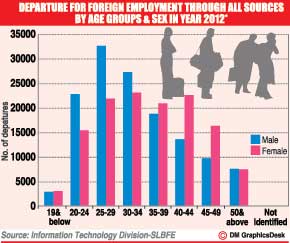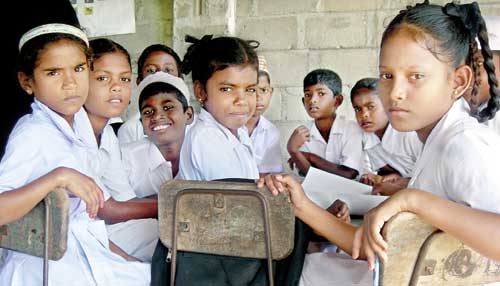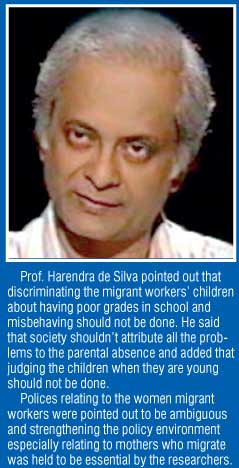Reply To:
Name - Reply Comment
Last Updated : 2024-04-24 11:56:00
_DM-recast--9(1).jpg) Sharing a simple example of an ordeal of a migrant worker’s child, an independent researcher - Kusala Wettasinghe, said a child she interviewed did not have any words, but only tears to express the mistreatments he went through because of his mother’s absence.
Sharing a simple example of an ordeal of a migrant worker’s child, an independent researcher - Kusala Wettasinghe, said a child she interviewed did not have any words, but only tears to express the mistreatments he went through because of his mother’s absence._DM-recast--9(2).jpg) Distressing stories of this nature are quite commonplace at present, but certainly less disturbing, considering the horrific incidents reported daily on children who fall victim to abuse by their guardians and even by their own fathers while the mother is away to earn a living.
Distressing stories of this nature are quite commonplace at present, but certainly less disturbing, considering the horrific incidents reported daily on children who fall victim to abuse by their guardians and even by their own fathers while the mother is away to earn a living. Burdened by the hardships of poverty and upon pleading their case with foreign employment agencies and moneylenders, managing to get a job, even if it means to sail the seven seas, is a consolation for the families of these migrant workers.
Burdened by the hardships of poverty and upon pleading their case with foreign employment agencies and moneylenders, managing to get a job, even if it means to sail the seven seas, is a consolation for the families of these migrant workers. Ms Wettasinghe, a psychosocial practitioner who was part of the study ‘Migrant workers’ children: alternate care giving’ pointed out that while abuse, neglect and other disadvantageous situations are faced even by children whose parents have not migrated, parent migration is a main cause that triggers incidents of such nature. The study was carried out in the Batticaloa and Ampara districts and was commissioned by Terre des homes, an organization working for developing living standards of children, participated by researchers Gethsie Shanmugam and Sarala Emmanuel as well.
Ms Wettasinghe, a psychosocial practitioner who was part of the study ‘Migrant workers’ children: alternate care giving’ pointed out that while abuse, neglect and other disadvantageous situations are faced even by children whose parents have not migrated, parent migration is a main cause that triggers incidents of such nature. The study was carried out in the Batticaloa and Ampara districts and was commissioned by Terre des homes, an organization working for developing living standards of children, participated by researchers Gethsie Shanmugam and Sarala Emmanuel as well._DM-recast--91.jpg) Professor de Silva pointed out that school counsellors need proper training with adequate knowledge on psychological training and said that they should be accessible easily to children.
Professor de Silva pointed out that school counsellors need proper training with adequate knowledge on psychological training and said that they should be accessible easily to children._DM-recast--92.jpg) National Child Protection Authority (NCPA) Chairman Anoma Dissanayake speaking to Daily Mirror said, the establishment of hostels that can accommodate children of migrant workers should be considered in light of minimizing incidents of abuse.
National Child Protection Authority (NCPA) Chairman Anoma Dissanayake speaking to Daily Mirror said, the establishment of hostels that can accommodate children of migrant workers should be considered in light of minimizing incidents of abuse._DM-recast--9safd.jpg) Impact on the children’s education Ms. Wettasinghe revealed that school dropouts were observed among children from migrant parent families and added that irrelevant of whether the migrant was the mother or the father, the occurrence was similar. “Girls, in families where the mother has migrated have dropped out of school as they were burdened with the household responsibilities such as caring for younger siblings. In families where the father had migrated, boys have dropped out from school due to the lack of control the mother has over the son,” she said.
Impact on the children’s education Ms. Wettasinghe revealed that school dropouts were observed among children from migrant parent families and added that irrelevant of whether the migrant was the mother or the father, the occurrence was similar. “Girls, in families where the mother has migrated have dropped out of school as they were burdened with the household responsibilities such as caring for younger siblings. In families where the father had migrated, boys have dropped out from school due to the lack of control the mother has over the son,” she said. What can be done to improve the current situation?
What can be done to improve the current situation?R.Suntha Wednesday, 03 October 2012 03:17 AM
There is no substitute for the Mother.Without the mother they are orphans.Without the mother the father too becomes an Uncle as the saying goes.Poverty is the reason that prompts them to migrate for the deceptine earning.It calls for concerted action not picemeal ,kneejerk reactions.

Add comment
Comments will be edited (grammar, spelling and slang) and authorized at the discretion of Daily Mirror online. The website also has the right not to publish selected comments.
Reply To:
Name - Reply Comment
US authorities are currently reviewing the manifest of every cargo aboard MV
On March 26, a couple arriving from Thailand was arrested with 88 live animal
According to villagers from Naula-Moragolla out of 105 families 80 can afford
Is the situation in Sri Lanka so grim that locals harbour hope that they coul